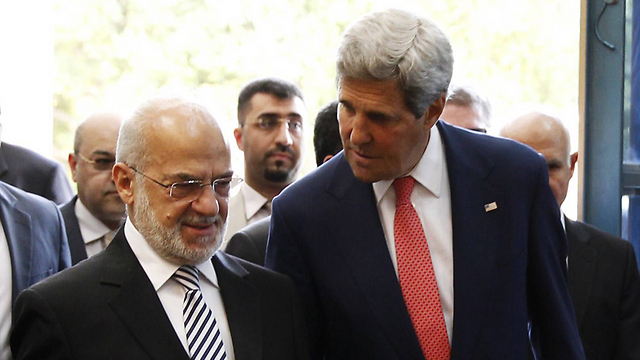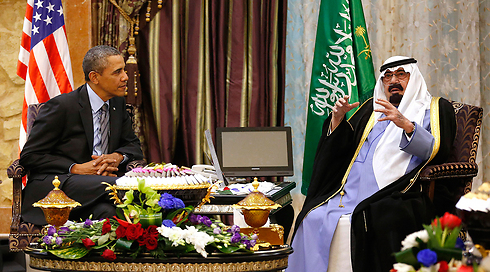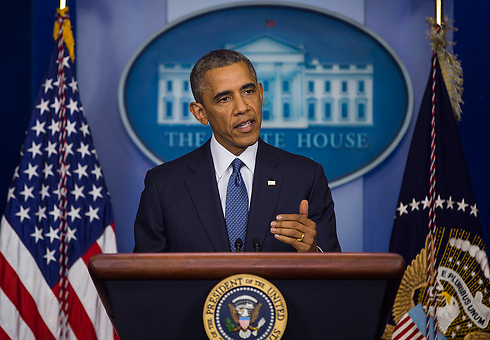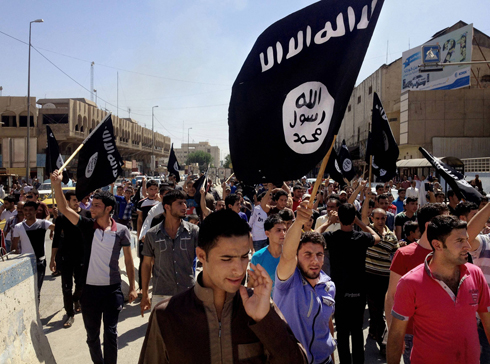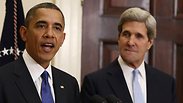
Netanyahu convenes ministers to discuss Islamic State threat
Livni presents legal plan to fight local Islamic State supporters; Obama set to give IS policy speech, could authorize air strikes in Syria as Kerry meets Iraqi PM in Baghdad, says 'new Iraqi gov't to be engine of our global strategy against IS'.
Prime Minister Benjamin Netanyahu held a meeting on Wednesday to discuss the threat the Islamic State poses to Israel and discuss legal solutions for its supporters in Israel.
Meanwhile, President Barack Obama called Saudi Arabia's King Abdullah on Wednesday ahead of an evening speech in which the US leader plans to lay out his strategy for defeating the militant group Islamic State, and could authorize air strikes against the group in Syria, US officials said.
Netanyahu was warned against the Islamic State during the Gaza operation, and on numerous occasions attempted to equate Hamas with the radical group currently ravaging Syria and Iraq. Recently, Israel outlawed the group.
The meeting was attended by the top echelon of the security establishment, Shin Bet, National Security Council, Foreign Ministry representatives, Justice Minister Tzipi Livni and Internal Security Minister Yitzhak Aharonovich, as well as Shin Bet head Yoram Cohen.
In the meeting, Justice Minister Livni presented a memorandum of law which will allow Israel to prosecute citizens working with groups expounding radical, fundamental Islamism – like that of the Islamic State.
Livni said that the move would help Israel "defend itself in the case of terror. "She noted however that without "political process with the Palestinian Authority" which she said will create "a strong axis with the Arab States," Israel we won't be able to join the united battle against the Islamic State.
"He who doesn’t want to solve the conflict – will bring us to conflict with those involved in beheadings," she warned in a veiled criticism of Netanyahu.
Meanwhile, US Secretary of State John Kerry on Wednesday endorsed Iraqi Prime Minister Haider al-Abadi's plans to mend Baghdad's relations with Sunnis and Kurds, and said Iraq was a partner in the fight against Islamic State militants.
Kerry, on a tour of the Middle East to build military, political and financial support to defeat the militants controlling parts of Iraq and Syria, said: "We all have an interest in supporting the new government of Iraq."
"The coalition that is at the heart of our global strategy I assure you will continue to grow and deepen in the days ahead ... because the United States and the world will simply not stand by to watch as ISIL's evil spreads." he said, using an alternative acronym for Islamic State.
"A new and inclusive Iraqi government has to be the engine of our global strategy against ISIL. Now the Iraqi parliament has approved a new cabinet with new leaders, with representation from all Iraqi communities, it's full steam ahead."
Obama, officials say, is prepared to authorize air strikes against the group in Syria. Obama has promised not to send combat troops back to the region, but he is expected to announce a commitment to provide more arms and training to rebel groups in Syria, a key element in any campaign of air attacks there.
The groups were formed with US encouragement to try to oust President Bashar Assad, but Washington did not provide them with the weapons they needed and they have been eclipsed by Islamist and al-Qaeda-associated movements.
After more than 150 US air strikes in Iraq in the last month, Iraqi and Kurdish forces have halted the Islamic State advance. Obama has signaled for days that he is willing to expand the mission to Syria, headquarters of the organization responsible for beheading two American journalists.
That is a significant shift for a president who has been reluctant to increase the U.S. military footprint in the region and three years ago pulled out the last combat troops from Iraq.
The president is scheduled to speak at 9 pm EDT (0100 GMT Thursday), an evening time slot that raises the profile and the stakes for his speech, which is one day before the anniversary of the Sept. 11, 2001, attacks on New York and the Pentagon.
Degrade and destroy
"Tonight you will hear ... how the United States will pursue a comprehensive strategy to degrade and ultimately destroy ISIL, including U.S. military action and support for the forces combating ISIL on the ground," a White House official said, using an acronym for the Islamic State.
"The president will discuss how we are building a coalition of allies and partners in the region and in the broader international community to support our efforts."
With the speech, Obama is trying to build on the support that has grown among the American public for military action, partly fueled by anger over the beheading of the journalists, and also appeal to likely international partners.
Obama spoke to Saudi Arabia's King Abdullah earlier on Wednesday as part of that effort and Secretary of State John Kerry, now visiting Baghdad, will be meeting with leaders across the region in the coming days.
The president told congressional leaders on Tuesday he does not need additional authorization to carry out his plan but the White House is eager to have their support along with that of the international community.
The Islamic State has taken over huge swathes of land in Iraq and Syria. Although U.S. officials say there is no imminent threat of attack against the United States, there are strong concerns that individuals from the West who went to fight with the group may return to their homelands and wreak havoc.
Obama is expected to say that he is prepared to authorize air strikes in Syria, according to a number of U.S. officials who spoke on condition of anonymity in advance of the speech. He said earlier the United States would seek out IS militants wherever they could be hit.
In a shift for a war-weary nation, new polls suggest the American people would support a sustained air campaign. A Washington Post-ABC News poll released Monday showed 71 percent of Americans support airstrikes in Iraq, up from 54 percent just three weeks ago. And 65 percent say they support extending airstrikes into Syria.
Taking that latter step would raise legal and geopolitical issues that Obama has long sought to avoid, particularly without formal congressional authorization.
Unlike in Iraq, Obama would not be acting at the invitation of a host government in Syria. However, some international law experts say airstrikes could be justified as a matter of self-defense if Obama argues the Islamic State group poses a threat to the US and its allies from inside Syria, whose government is unwilling or unable to stop it.
Another possibility: Although the US has said it will not coordinate with Syrian President Bashar Assad, his government could give back-channel consent to American strikes. The US has a similar arrangement with the Pakistani military for US drone strikes there, even though Pakistani officials publicly condemn the American actions.
Obama would still have to contend with the notion that American strikes against the Islamic State militants were actually helping Assad, who has overseen Syria's bloody civil war. The US has long called for Assad to leave power, and the Islamic State is one of the groups inside Syria that is seeking to oust him.
The Associated Press and Reuters contributed to this report










